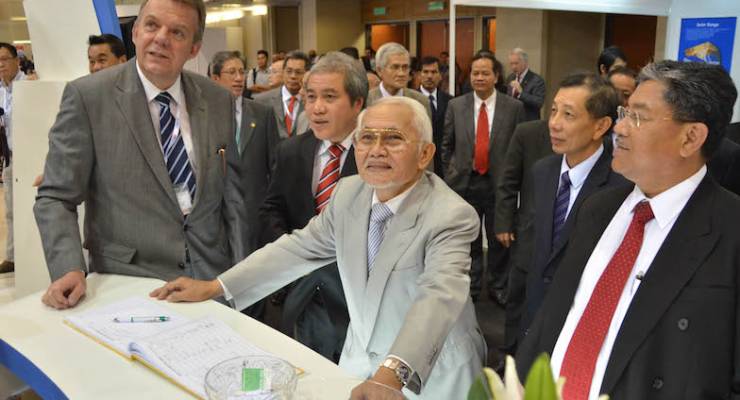
In May, Malaysia’s new Prime Minister Mahathir Mohammad pledged to root out corruption, nepotism and cronyism in the Malaysian administration.
Yet months later, Malaysian public commentators, academics and politicians plead for investigations to be reopened into corruption allegations, and for legal action to be taken against Taib Mahmud, billionaire governor of the east Malaysian state Sarawak, who reportedly has concerning ties to Australia.
In 2015, Taib was suspected of laundering A$30 million through investments in Adelaide’s Hilton Hotel. Despite the issue being raised both in the South Australian parliament and mainstream media, it appears neither Australian police nor regulators investigated him.
Another of Taib’s supposed contentious Australian links is with Tasmanian logging company, Ta Ann Holdings, established in 2005. Ta Ann is run by Hamed Sepawi, another scandal-plagued Malaysian politician and cousin of Taib Mahmud. Ta Ann has faced scrutiny from conservation groups over its role in the destruction of old-growth eucalypt forests in Tasmania.
Taib’s alleged Australian ties aren’t merely economic. He graduated as a Colombo Plan scholar with a Bachelors of Law from the University of Adelaide in 1961. A university courtyard, previously named after him, was renamed in 2016 because of pressure from conservation groups. The university also faced criticism for receiving donations of up to $400,000 from Taib.
The Malaysian perspective
Taib — known as Pak Uban or the “white haired uncle” — allegedly ruled resource-rich Sarawak as a private fiefdom during his tenure as chief minister from 1981 to 2014. Critics claim Taib enriched his family over decades through huge infrastructure contracts, logging permits, land seizures and bribery.
As a result, the Taibs reportedly accrued a fortune worth over US$20 billion, establishing business arms through over 400 companies in at least 25 countries. At the same time, 90% of Sarawak’s primeval rainforests were logged, displacing large populations of indigenous communities.
As Chief Minister, Taib enjoyed a relatively free rule over Sarawak’s finance, planning and resource management. According to Dr. Andrew Aeria, associate professor at University Malaysia Sarawak, this was owing to Taib’s crucial role in keeping the National Front coalition in office.
From 1981 to 2003, the National Front was led by Prime Minister Mahathir Mohammad who benefited greatly from Taib’s cemented rule in Sarawak. Because of this mutually beneficial relationship, Mahathir sceptics now dispute the strength of the Alliance of Hope’s anti-corruption measures against allegations hanging over Taib.
Local politicians and activists have lodged numerous graft reports against Taib with the Malaysian Anti-Corruption Commission (MACC) since 2011. However, MACC claims to be powerless in taking formal action against Taib because “investigations unveil he did not chair any business meetings or make decisions”.
Seeing how “nothing more could be done unless new information surfaced”, Taib’s case was dismissed from MACC and handed to Malaysia’s Attorney General’s Chambers in July. Subsequently, political activists, commentators and Sarawakian opposition party members voiced their dissatisfaction.
British investigative journalist Clare Rewcastle-Brown claimed the ruling party, Alliance of Hope, had a moral obligation to investigate corruption allegations against Taib, quickly and efficiently.
Rights groups Solidariti Anak Sarawak and Sarawak 4 Sarawakians openly questioned whether the Alliance of Hope’s electoral promise to root out corruption, cronyism and nepotism also extended to Sarawak.
Sarawak’s Democratic Action Party (DAP) state opposition leaders held a press conference where state assemblyman Wong King Wei called on MACC to at least get a statement from Taib or relevant parties before dismissing his case. Meanwhile, MP Dr Kelvin Yii insisted MACC should further investigate Taib, operating as an independent unit without fear or favour.
Taib’s global business reach
Taib’s wealth has spread across the globe, according to claims by Bruno Manser Funds (BMF), a Swiss NGO dedicated to saving Malaysia’s rainforests. BMF’s allegations have not only caused stirs in Australia but, more recently, Canada.
In September 2017, BMF accused Taib and family of funneling corruption proceeds into Canada by financing the expansion of Ottawa-based Sakto Group’s C$250 million real estate business. Sakto group, founded in 1983, is run by Taib’s daughter Jamilah Taib Murray and her husband Sean Murray.
BMF launched a legal bid seeking financial records from the country’s biggest financial firms — Royal Bank of Canada, Toronto-Dominion Bank, Manulife Financial Corp. and Deloitte & Touche. However, BMF emerged unsuccessful when a judge from the Ontario Superior Court of Justice cited insufficient evidence linking Sakto Group to any Malaysian corruption.
In August, Sakto Group filed for an injunction ordering BMF to remove from the public domain “false statements and speculative allegations relating to” them. But Lukas Straumann, BMF’s executive director, maintained the NGO’s allegations against the Taib family, saying, “the facts are on our side”.
BMF has released over 10 reports to date, detailing Sarawak’s allegedly corrupt administration and its global reverberations.







Sounds like a good case for the legislation recently used in the UK – Unexplained Assets Seizure.
Explain how astute, legal bizwhizzery led to the billions or be in deep doo-doo.
I could think of several high profile people in this country who would be eligible for consideration.